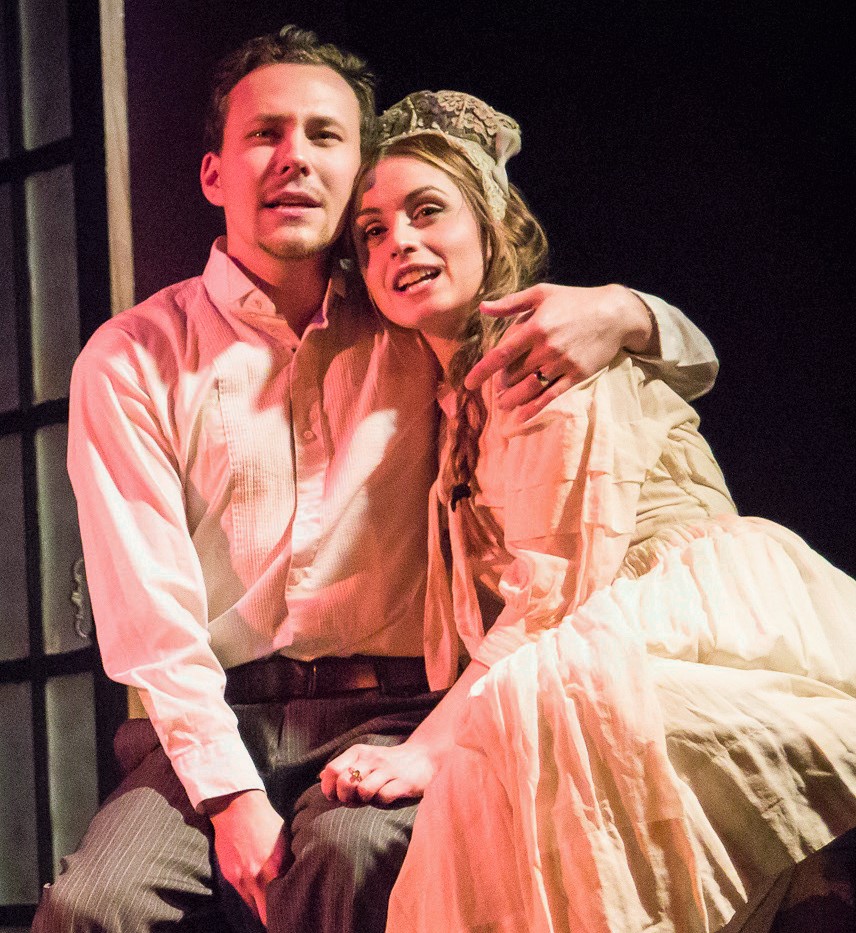Young Frankenstein, a revised version of Mel Brooks’s 2007 Broadway musical parody, is winning accolades over in London, but Eric B. Sirota’s version of the Frankenstein story, receiving its world premiere on a budget a hundredth of the size, is surely much more faithful to Mary Shelley’s 1818 novel. Sirota, who wrote the book, music and lyrics for Frankenstein, imbues his show with the serious philosophical underpinnings of Shelley’s original: the dangers of man playing God, the belief in a higher power, the pitfalls that science may hold for overweening practitioners. But even with capable performers, the more adult approach comes up short.
Jonathan Cobrda is Victor Frankenstein, and Amy Londyn is his fiancée, then wife, Elizabeth, in Frankenstein. Photo by Danny Bristoll. Top: Frankenstein with the raw material for his creation (Danny Bristoll). Photo by Adam Smith Jr.
Sirota’s score, though not sung-through, has swaths of melodic music that suggest it’s rubbing shoulders with operetta. That choice is justifiable, since the story was inspired by Shelley’s visit to Frankenstein Castle in Germany’s Rhineland—although the novel takes place in and around Geneva. Still, Germany, along with Austria-Hungary, gave rise to the operettas of Johann Strauss II, Emmerich Kálmán, Franz von Suppé, and Franz Lehár, with their scintillating, earworm melodies. Still, there’s an air of genteelness that hangs over it all.
The melodies at St. Luke’s are sometimes enjoyable, if not so striking. Whether through acoustics or underpowered sound, the voices are occasionally a strain to hear clearly, with the exception of Danny Bristoll’s Creature, a strapping rather than hulking monster with no name but ample projection. Bristoll commands the stage whenever he’s on it, although his appearance is less alarming than any half dozen New York denizens one might encounter on a subway. But apparently the Creature, in the span of the show (and presumably Shelley’s original), is able to wander the earth without raising suspicions about his origin, let alone spurring townspeople to take up pitchforks.
Sirota gives full weight to the non-monster elements of the story, which is largely framed as a flashback, as Victor Frankenstein (Jonathan Cobrda), his life ruined by the Creature he created and abandoned, hunts his nemesis and, during a breather, flashes back to his life. The story gets rolling with his return home after living away at school, where he has studied art. Family, including his friend Henry (an effete Benjamin Haupt), his father (Charles Baran), and his true love, Elizabeth (a radiant Amy Londyn), welcome him home. Soon, though, he has set up a la-BOR-atory and is puttering around in it. Cobrda conveys the fundamental decency gone awry as the character becomes more obsessed with his project.
Perhaps because the story has become so familiar—through the Boris Karloff film and even Brooks’s laugh-driven parody—this production doesn’t send the chills through one’s spine that it might. Victor animates a corpse, and the Creature promptly flees. It’s only when Bristoll’s surly Creature returns with the demand “Make me a mate” that things become potentially unsettling. Victor and the Creature have a fine, passionate duet, but Victor adamantly refuses, and a mishap causes the Creature to flee. That naturally leads to bad things happening.
Cait Kiley (left) and Charles Baran play a comical pair of innkeepers. Photo by Danny Bristoll.
Director Clint Hromsco tries to inject some chills later on but fumbles them. When the Creature returns to settle the score, Elizabeth and the doctor are about to celebrate their wedding night. Once Victor leaves the room, one suspects the Creature is close at hand, but it does nothing to heighten the fear factor that Londyn’s Elizabeth stands by open French doors singing apprehensively about “footsteps at night” without even trying to close and lock them. (The doors are left open more than once when a viewer wants to see them shut, but that is a staple of the horror genre; still, when the character actually is jittery rather than unaware, leaving the door open is just perverse.)
The shoestring budget doesn’t allow for fancy lab equipment: set designer Matthew Imhoff makes do with nondescript furnishings, except for flickering sconces on a vaguely dungeon-like wall, and Maarten Cornelis helps out with one brief but memorable electrocution.
Sirota also has the good sense to include a comic scene of an elderly couple preparing the bridal chamber at the inn—Baran and Cait Kiley as his spouse let loose in the song “Wedding Night,” and Hromsco has staged a nifty moment when they pop up unexpectedly. Unfortunately, as canny as Sirota may be about structuring a musical and as earnest as he is about returning to Shelley’s original for inspiration, the result fails to reanimate the story with thrills to match its existential struggles.
The Write Act Repertory production of Frankenstein plays on Monday nights at 7 p.m. through Dec. 18 at St. Luke’s Theatre (308 West 46th St. between Eighth and Ninth avenues). Tickets cost between $20 and $99 and may be purchased by calling (212) 239-6200 or by visiting telecharge.com. For more information, visit thefrankensteinmusical.com.





